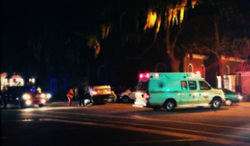DUI Accidents: How Does a DUI Driver Affect the Value of Your Case? Jarrett & Price, Auto Accident Attorneys Jarrett & Price, Auto Accident Attorneys
Auto accidents caused by DUI drivers add a host of issues to any personal injury claim. These cases often involve punitive damages (damages that are designed to punish the at-fault party), which can greatly impact the value of a victim’s claim. These cases can also pose insurance coverage issues and are often complicated by pending criminal charges against the at-fault driver which are prosecuted by the state in criminal courts.
Punitive Damages If you are in an accident caused by a DUI driver then you are probably entitled to punitive damages. Punitive damages are damages designed to punish the at-fault party monetarily to deter similar conduct and are found in code section O.C.G.A. § 51-12-5.1. While punitive damages are not always available in a typical car accident case, they are almost always a factor in cases where drugs or alcohol are involved. In order to claim punitive damages, the conduct must be more than negligent. In Georgia, the plaintiff must show “clear and convincing evidence” that the defendant’s conduct showed “willful misconduct, malice, fraud, wantonness, oppression, or entire wont of care which would raise the presumption of conscious indifference to the consequences.” This is a high standard, however, cases where intoxication is evident or even suspected by the at-fault driver almost always rise to this level. In most situations, Georgia law caps punitive damages at $250,000. However, the legislature carved out an important exception in part (f) of this code section, by removing the cap where the at-fault party is impaired by drugs and alcohol, O.C.G.A. § 51-12-51.1(f). This has a tremendous effect on the potential damages awarded by a jury in any case involving DUI drugs or alcohol. Where actual injuries are slight, there are many cases where juries have awarded punitive damages in the tens of thousands of dollars to punish the defendant driver. In cases involving catastrophic injuries or death caused by DUI drivers, the potential for punitive damages is uncapped and can reach into the millions of dollars. Insurance Coverage Large punitive damage awards are meaningless if there are not sufficient assets or insurance to cover the damage award. That’s why finding all available sources of insurance -- and carefully reading the contract language for each policy of insurance, is vital in every DUI case. While Georgia courts do not allow insurance carriers to exclude coverage for drunk driving, they do allow carriers to exclude coverage for punitive damages. Also, it’s important to note that Uninsured/Underinsured Motorist coverage (“UM”) does not usually cover punitive damages. All available sources of insurance coverage applying to the accident must carefully be investigated by the personal injury attorney. The language in each policy must be evaluated to determine whether there is coverage for punitive damages for any punitive award. It is also vital to do an asset check of the at-fault party to determine if there are any personal assets which could potentially cover a punitive damage award should coverage not apply. Criminal cases There is often a criminal case involved in an accident caused by a DUI driver which must be taken into account by the attorney. While most DUIs are a misdemeanor, they are considered a misdemeanor of a high and aggravated nature and often involve some jail time for a convicted defendant. DUI cases and penalties are more serious if the at-fault driver has previous DUI convictions and/or if the accident involved serious injury or death. Georgia has special criminal code sections for serious injury by vehicle, O.C.G.A. § 40-6-394, feticide by vehicle, § 40-6-393.1, and vehicular homicide, O.C.G.A. § 40-6-393, which are felonies and can be punishable by years of incarceration. The state’s prosecution of the at-fault driver triggers 5th Amendment issues which can effect how civil depositions and trial are conducted. Because the defendant has a right not to make potential incriminating statements while his criminal case is pending, they have a right not to answer certain questions asked by the personal injury attorney in the civil case. However, unlike in a criminal case, a civil jury is allowed to presume the defendant’s reason for silence or unwillingness to answer questions at trial is because the answer is against his interest. This has a major impact on how a personal injury attorney conducts his questioning at trial. If you have been injured in an accident cause by a DUI, contact the Georgia accident attorneys at Jarrett & Price for a free consultation and an attorney at our firm WILL return your call. |
|
